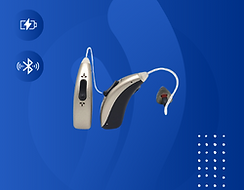Why Hearing Aids Could Save Your Life
- May 23, 2023
- 4 min read
Updated: Jun 15, 2023
Hearing loss is experienced by 26.7 million Americans over the age of 50, however, only one in seven use hearing aids.

It’s common knowledge by now that there’s a correlation between hearing loss and its direct negative impact on one’s overall health. Communication troubles, isolation, depression, fatigue, risk of falls and cognitive decline have a higher occurrence in Seniors with hearing loss. That’s something you may have already read about. But one thing you might not be aware of is that life expectancy can also be reduced by not treating hearing loss. One simple solution to increasing your longevity, is hearing aids.
Hearing loss is experienced by 26.7 million Americans over the age of 50, however, only one in seven use hearing aids. About one-third of U.S. adults aged 65 to 74 suffer from some form of hearing loss.
Medicare and most health insurance providers still treat hearing loss as a normal part of aging, not a medical problem, and don’t cover the costs of hearing aids or even routine hearing tests. That’s why and average pair of hearing aids can set you back over $3,000.
But about a decade ago, scientists began focusing more on the potential harms of hearing loss as well as loneliness. Before long, it became clear that both conditions had enormous medical consequences, with ramifications that may lead to other medical disorders.
A study published last year in JAMA Otolaryngology found that loneliness is associated with high blood pressure, elevated stress and weakened immune systems. Their research found that these feelings of isolation also raise the risk of dementia by 40% and the odds of early death by 26%.
Meanwhile, untreated hearing loss increases the risk of dementia by 50%, depression by 40% and falls by 30%. The study found that people wearing hearing aids could delay the onset of dementia and Alzheimer’s disease.
Research conducted by the Johns Hopkins School of Medicine and the National Institute on Aging concluded that hearing loss is a key factor in falls, and mild hearing loss can result in someone being three times as likely to fall. Because the effects of hearing loss are directly impacting your spatial awareness, your posture and body control, hearing better will reduce your chances of falling.
It also shows that those with a hearing impairment have poorer balance, worse walking endurance, and faster declines in physical function over time compared to those with normal hearing. In fact, the worse the person’s hearing, the worse the physical function. The study continues. “Collectively, these findings suggest that individuals with hearing impairment may be at greater risk for physical function limitations.” Simply put, hearing aids reduce the risk of falls and will slow overall physical decline.
In addition, the researchers at Johns Hopkins note that other problems including greater risk of stroke and heart disease were seen in older people who had hearing loss. When you understand what the causes of hearing loss are, these results make more sense. Many cases of hearing loss are tied to heart disease since high blood pressure affects the blood vessels in the ear canal. When you have shrunken blood vessels, the body needs to work harder to push the blood through which results in high blood pressure.
In a difficult or stressful situation, if you are not able to hear warnings to avoid imminent danger, like oncoming traffic, you are likely to have a higher risk of injury or accident. Therefore, hearing better can reduce your chances of hospitalization. Results published in the journal of the American Medical Association paper concluded that people with mild hearing loss or more were more likely to be hospitalized compared to individuals with normal hearing.

In summary, hearing loss will increase your risk of isolation, which may lead to mental health issues such as cognitive decline, dementia and Alzheimer’s, leading to other life-threatening diseases like balance disorders, high blood pressure, heart disease and a higher risk of hospitalization, hence reducing your overall life span. Unfortunately hearing loss is a degenerative condition, where it deteriorates, if not maintained, the downward spiral that can occur with hearing loss means that these comorbidities are possibly amplified, if not accelerated.
There are several solutions available to manage hearing loss, but as is shown by research, it is best to deal with these issues early before they affect and degrade your general health. Hearing aids are one of the simplest forms of treatment that can be very effective in dealing with your hearing loss.
There is hope. A small study even found that wearing hearing aids “may reverse compensatory changes in cortical resource allocation”—in other words, negative changes in your brain may improve with consistent hearing aid use. Brain shrinkage may slow or stop, and your brain my begin to pick up on sound signals once more.
Everyone wants to lead a healthy, happy and longer life by eating right and exercising. However, your hearing health also plays a crucial factor in helping you live your best life. A study conducted by the National Council on Aging found that 42% of hearing aid users participate in social activities compared to 32% of people with untreated hearing issues. Combine those healthy living habits with an emphasis on your hearing health, as they are both important to extending your lifespan.





.png)
.png)
.png)
Comments